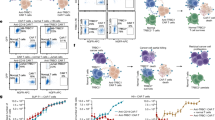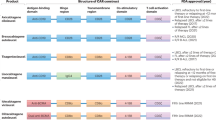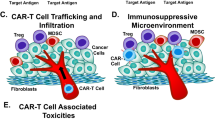Abstract
Salvage chemotherapy followed by autologous stem cell transplantation (ASCT) is the standard second-line treatment for relapsed and refractory diffuse large B-cell lymphoma (DLBCL). However, the strategy is less clear in patients who require third-line treatment. Updated outcomes of 203 patients who could not proceed to scheduled ASCT in the Collaborative Trial in Relapsed Aggressive Lymphoma (CORAL) are herein reviewed. In the intent-to-treat analysis, overall response rate to third-line chemotherapy was 39%, with 27% CR or CR unconfirmed, and 12% PR. Among the 203 patients, 64 (31.5%) were eventually transplanted (ASCT 56, allogeneic SCT 8). Median overall survival (OS) of the entire population was 4.4 months. OS was significantly improved in patients with lower tertiary International Prognostic Index (IPI), patients responding to third-line treatment and patients transplanted with a 1-year OS of 41.6% compared with 16.3% for the not transplanted (P<0.0001). In multivariate analysis, IPI at relapse (hazard ratio (HR) 2.409) and transplantation (HR 0.375) independently predicted OS. Third-line salvage chemotherapy can lead to response followed by transplantation and long-term survival in DLBCL patients. However, improvement of salvage efficacy is an urgent need with new drugs.
This is a preview of subscription content, access via your institution
Access options
Subscribe to this journal
Receive 12 print issues and online access
$259.00 per year
only $21.58 per issue
Buy this article
- Purchase on Springer Link
- Instant access to full article PDF
Prices may be subject to local taxes which are calculated during checkout




Similar content being viewed by others
References
Philip T, Guglielmi C, Hagenbeek A, Somers R, Van der Lelie H, Bron D et al. Autologous bone marrow transplantation as compared with salvage chemotherapy in relapses of chemotherapy-sensitive non-Hodgkin's lymphoma. N Engl J Med 1995; 333: 1540–1545.
Gisselbrecht C . Is there any role for transplantation in the rituximab era for diffuse large B-cell lymphoma? Hematology Am Soc Hematol Educ Program 2012; 2012: 410–416.
Vellenga E, van Putten WL, van 't Veer MB, Zijlstra JM, Fibbe WE, van Oers MH et al. Rituximab improves the treatment results of DHAP-VIM-DHAP and ASCT in relapsed/progressive aggressive CD20+ NHL: a prospective randomized HOVON trial. Blood 2008; 111: 537–543.
Karlin L, Coiffier B . Improving survival and preventing recurrence of diffuse large B-cell lymphoma in younger patients: current strategies and future directions. Onco Targets Ther 2013; 6: 289–296.
Coiffier B, Thieblemont C, Van Den Neste E, Lepeu G, Plantier I, Castaigne S et al. Long-term outcome of patients in the LNH-98.5 trial, the first randomized study comparing rituximab-CHOP to standard CHOP chemotherapy in DLBCL patients: a study by the Groupe d'Etudes des Lymphomes de l'Adulte. Blood 2010; 116: 2040–2045.
Gunnellini M, Emili R, Coaccioli S, Liberati AM . The role of autologous stem cell transplantation in the treatment of diffuse large B-cell lymphoma. Adv Hematol 2012; 2012: 195484.
Gisselbrecht C, Glass B, Mounier N, Singh Gill D, Linch DC, Trneny M et al. Salvage regimens with autologous transplantation for relapsed large B-cell lymphoma in the rituximab era. J Clin Oncol 2010; 28: 4184–4190.
Gisselbrecht C, Schmitz N, Mounier N, Singh Gill D, Linch DC, Trneny M et al. Rituximab maintenance therapy after autologous stem-cell transplantation in patients with relapsed CD20(+) diffuse large B-cell lymphoma: final analysis of the collaborative trial in relapsed aggressive lymphoma. J Clin Oncol 2012; 30: 4462–4469.
Hamadani M, Hari PN, Zhang Y, Carreras J, Akpek G, Aljurf MD et al. Early failure of frontline rituximab-containing chemo-immunotherapy in diffuse large B cell lymphoma does not predict futility of autologous hematopoietic cell transplantation. Biol Blood Marrow Transplant 2014; 20: 1729–1736.
Mounier N, Canals C, Gisselbrecht C, Cornelissen J, Foa R, Conde E et al. High-dose therapy and autologous stem cell transplantation in first relapse for diffuse large B cell lymphoma in the rituximab era: an analysis based on data from the European Blood and Marrow Transplantation Registry. Biol Blood Marrow Transplant 2012; 18: 788–793.
Crump M, Kuruvilla J, Couban S, MacDonald DA, Kukreti V, Kouroukis CT et al. Randomized comparison of gemcitabine, dexamethasone, and cisplatin versus dexamethasone, cytarabine, and cisplatin chemotherapy before autologous stem-cell transplantation for relapsed and refractory aggressive lymphomas: NCIC-CTG LY.12. J Clin Oncol 2014; 32: 3490–3496.
Van Den Neste E, Gisselbrecht C, Schmitz N, Mounier N, Gill DS, FMedSci DL et al. Diffuse large B-cell lymphoma (DLBCL) patients failing second-line R-DHAP or R-ICE chemotherapy included in the Coral Study. Blood 2013; 122: 764.
Cheson BD, Horning SJ, Coiffier B, Shipp MA, Fisher RI, Connors JM et al. Report of an international workshop to standardize response criteria for non-Hodgkin's lymphomas. NCI Sponsored International Working Group. J Clin Oncol 1999; 17: 1244.
Thieblemont C, Briere J, Mounier N, Voelker HU, Cuccuini W, Hirchaud E et al. The germinal center/activated B-cell subclassification has a prognostic impact for response to salvage therapy in relapsed/refractory diffuse large B-cell lymphoma: a bio-CORAL study. J Clin Oncol 2011; 29: 4079–4087.
Hans CP, Weisenburger DD, Greiner TC, Gascoyne RD, Delabie J, Ott G et al. Confirmation of the molecular classification of diffuse large B-cell lymphoma by immunohistochemistry using a tissue microarray. Blood 2004; 103: 275–282.
Nagle SJ, Woo K, Schuster SJ, Nasta SD, Stadtmauer E, Mick R et al. Outcomes of patients with relapsed/refractory diffuse large B-cell lymphoma with progression of lymphoma after autologous stem cell transplantation in the rituximab era. Am J Hematol 2013; 88: 890–894.
Hamadani M, Hari PN, Zhang Y, Carreras J, Akpek G, Aljurf MD et al. Early failure of frontline rituximab-containing chemo-immunotherapy in diffuse large B cell lymphoma does not predict futility of autologous hematopoietic cell transplantation. Biol Blood Marrow Transplant 2014; 20: 1729–1736.
Gisselbrecht C . Futility of relapsed diffuse large B cell lymphoma transplantation? Biol Blood Marrow Transplant 2014; 20: 1667–1669.
Glass B, Hasenkamp J, Wulf G, Dreger P, Pfreundschuh M, Gramatzki M et al. Rituximab after lymphoma-directed conditioning and allogeneic stem-cell transplantation for relapsed and refractory aggressive non-Hodgkin lymphoma (DSHNHL R3): an open-label, randomised, phase 2 trial. Lancet Oncol 2014; 15: 757–766.
Robinson SP, Goldstone AH, Mackinnon S, Carella A, Russell N, de Elvira CR et al. Chemoresistant or aggressive lymphoma predicts for a poor outcome following reduced-intensity allogeneic progenitor cell transplantation: an analysis from the Lymphoma Working Party of the European Group for Blood and Bone Marrow Transplantation. Blood 2002; 100: 4310–4316.
Chevallier P, Labopin M, Milpied N, Bilger K, Socie G, Yakoub-Agha I et al. Outcomes of adults with active or progressive hematological malignancies at the time of allo-SCT: a survey from the Societe Francaise de Greffe de Moelle et de Therapie Cellulaire (SFGM-TC). Bone Marrow Transplant 2014; 49: 361–365.
Hamadani M, Saber W, Ahn KW, Carreras J, Cairo MS, Fenske TS et al. Impact of pretransplantation conditioning regimens on outcomes of allogeneic transplantation for chemotherapy-unresponsive diffuse large B cell lymphoma and grade III follicular lymphoma. Biol Blood Marrow Transplant 2013; 19: 746–753.
van Kampen RJ, Canals C, Schouten HC, Nagler A, Thomson KJ, Vernant JP et al. Allogeneic stem-cell transplantation as salvage therapy for patients with diffuse large B-cell non-Hodgkin's lymphoma relapsing after an autologous stem-cell transplantation: an analysis of the European Group for Blood and Marrow Transplantation Registry. J Clin Oncol 2011; 29: 1342–1348.
Elstrom RL, Martin P, Ostrow K, Barrientos J, Chadburn A, Furman R et al. Response to second-line therapy defines the potential for cure in patients with recurrent diffuse large B-cell lymphoma: implications for the development of novel therapeutic strategies. Clin Lymphoma Myeloma Leuk 2010; 10: 192–196.
Seshadri T, Stakiw J, Pintilie M, Keating A, Crump M, Kuruvilla J . Utility of subsequent conventional dose chemotherapy in relapsed/refractory transplant-eligible patients with diffuse large B-cell lymphoma failing platinum-based salvage chemotherapy. Hematology 2008; 13: 261–266.
Simpson L, Ansell SM, Colgan JP, Habermann TM, Inwards DJ, Ristow KM et al. Effectiveness of second line salvage chemotherapy with ifosfamide, carboplatin, and etoposide in patients with relapsed diffuse large B-cell lymphoma not responding to cis-platinum, cytosine arabinoside, and dexamethasone. Leuk Lymphoma 2007; 48: 1332–1337.
Ardeshna KM, Kakouros N, Qian W, Powell MG, Saini N, D'Sa S et al. Conventional second-line salvage chemotherapy regimens are not warranted in patients with malignant lymphomas who have progressive disease after first-line salvage therapy regimens. Br J Haematol 2005; 130: 363–372.
Valera A, Lopez-Guillermo A, Cardesa-Salzmann T, Climent F, Gonzalez-Barca E, Mercadal S et al. MYC protein expression and genetic alterations have prognostic impact in patients with diffuse large B-cell lymphoma treated with immunochemotherapy. Haematologica 2013; 98: 1554–1562.
Gisselbrecht C . Should we replace dexamethasone, cytarabine, and cisplatin for relapsed lymphoma? J Clin Oncol 2014; 32: 3472–3473.
Morschhauser FA, Cartron G, Thieblemont C, Solal-Celigny P, Haioun C, Bouabdallah R et al. Obinutuzumab (GA101) monotherapy in relapsed/refractory diffuse large b-cell lymphoma or mantle-cell lymphoma: results from the phase II GAUGUIN study. J Clin Oncol 2013; 31: 2912–2919.
Matasar MJ, Czuczman MS, Rodriguez MA, Fennessy M, Shea TC, Spitzer G et al. Ofatumumab in combination with ICE or DHAP chemotherapy in relapsed or refractory intermediate grade B-cell lymphoma. Blood 2013; 122: 499–506.
Younes A, Thieblemont C, Morschhauser F, Flinn I, Friedberg JW, Amorim S et al. Combination of ibrutinib with rituximab, cyclophosphamide, doxorubicin, vincristine, and prednisone (R-CHOP) for treatment-naive patients with CD20-positive B-cell non-Hodgkin lymphoma: a non-randomised, phase 1b study. Lancet Oncol 2014; 15: 1019–1026.
Mathews Griner LA, Guha R, Shinn P, Young RM, Keller JM, Liu D et al. High-throughput combinatorial screening identifies drugs that cooperate with ibrutinib to kill activated B-cell-like diffuse large B-cell lymphoma cells. Proc Natl Acad Sci USA 2014; 111: 2349–2354.
Acknowledgements
We thank the LYSARC for coordinating the study; Fabienne Morand, Sami Boussetta, Marion Fournier, Laurence Girard, Clemence Capron and the project leaders from the different countries; the patients and their families; AJE for reviewing the English; Catherine Druon for preparing the manuscript; and all investigators (see Supplementary Materials) and pathologists. This work was supported by research grants from F-Hoffmann La Roche Ltd, LYSARC. Written on behalf of the CORAL (Collaborative trial in Relapsed Aggressive Lymphoma).
Author information
Authors and Affiliations
Corresponding author
Ethics declarations
Competing interests
CG: Roche—Research Funding. MT: Roche—Honoraria, Research Funding. JR: Roche—Consultancy. OS: Roche—Consultancy, Honoraria, Research Funding. UD: Roche Pharma—Honoraria, Research Funding. CHM: Genentech—Consultancy, Research Funding. BG: Roche—Honoraria, Research Funding. GS: Roche—Honoraria, research funding. The authors declare no conflict of interest.
Additional information
Preliminary results were presented at the 55th ASH 2013 annual meeting (Blood 2013; 122: 764).
Supplementary Information accompanies this paper on Bone Marrow Transplantation website
Supplementary information
Rights and permissions
About this article
Cite this article
Van Den Neste, E., Schmitz, N., Mounier, N. et al. Outcome of patients with relapsed diffuse large B-cell lymphoma who fail second-line salvage regimens in the International CORAL study. Bone Marrow Transplant 51, 51–57 (2016). https://doi.org/10.1038/bmt.2015.213
Received:
Accepted:
Published:
Issue Date:
DOI: https://doi.org/10.1038/bmt.2015.213
This article is cited by
-
Novel CD19-specific γ/δ TCR-T cells in relapsed or refractory diffuse large B-cell lymphoma
Journal of Hematology & Oncology (2023)
-
Safety and efficacy of tisagenlecleucel in patients with relapsed or refractory B-cell lymphoma: the first real-world evidence in Japan
International Journal of Clinical Oncology (2023)
-
Clinical relevance of MYC/BCL2 expression and cell of origin in patients with diffuse large b-cell lymphoma treated with autologous transplant
Bone Marrow Transplantation (2023)
-
Outcomes of first therapy after CD19-CAR-T treatment failure in large B-cell lymphoma
Leukemia (2023)
-
Outcomes of polatuzumab vedotin-containing regimens in real-world setting of relapsed and or refractory diffuse large B-cell lymphoma patients: a matched-control analysis from the Thai Lymphoma Study Group (TLSG)
Annals of Hematology (2023)



